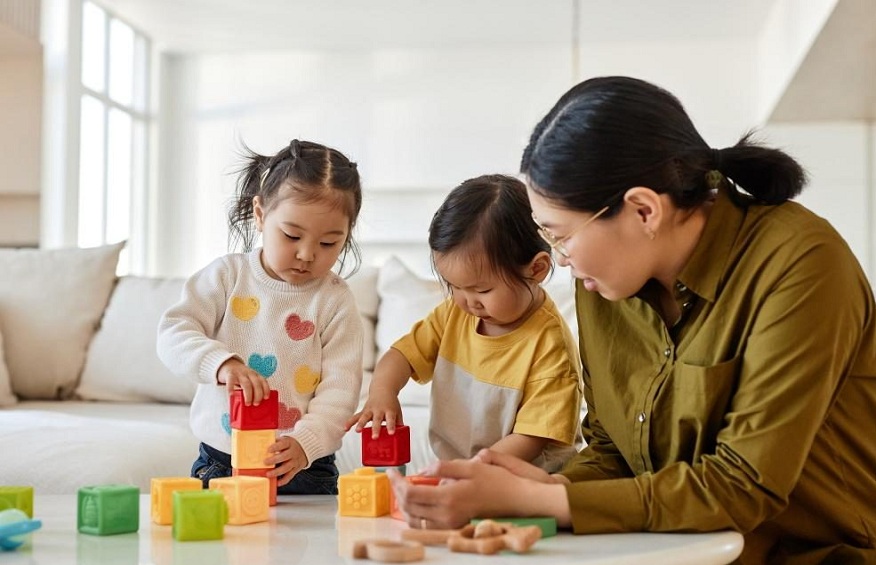Playtime often stands as a beloved activity for children, a time when they can enjoy themselves, express creativity in a room with kids room wallpaper, and let their imagination roam freely. However, beyond the happiness and amusement, playtime serves a deep purpose in shaping children’s cognitive, social, emotional, and physical development. In this article, we will explore the significance of playtime in child growth and examine the diverse ways through which play fosters essential abilities for a child’s progress.
Cognitive Development
Playtime functions as a natural learning space where children can experiment, explore, and learn through hands-on experiences. Whether it involves constructing with blocks, solving puzzles, or participating in imaginative play, children are continuously presented with challenges to think critically, solve problems, and make decisions. Play encourages them to utilize their imagination and originality, promoting the development of their cognitive skills.
Through play, children cultivate crucial cognitive skills such as understanding spatial relationships, retaining memory, and thinking logically. For example, constructing a tower with blocks teaches them about equilibrium, steadiness, and spatial connections.The parent or a babysitter ensures that playtime is a delightful adventure for your little ones. Puzzles boost their capability to identify patterns and develop strategies to accomplish their goals. These encounters establish the groundwork for academic achievement by nurturing a passion for learning and a curiosity-driven mindset.
Social and Emotional Development
Playtime offers children invaluable chances to interact with their peers, aiding in the development of vital social and emotional abilities. Whether it encompasses make-believe games, participating in team sports, or engaging in group activities, children learn to communicate, share, cooperate, and negotiate with others. These interactions build empathy, understanding, and the competence to navigate different social situations.
Through play, children also learn to regulate their emotions and develop resilience. Imaginary play, for instance, allows them to explore diverse roles and emotions in a safe setting. They can enact scenarios that aid in comprehending and processing their feelings, fears, and desires. Play also encourages emotional regulation as children learn to manage impulses, handle conflicts, and manage challenges.
Physical Development
Physical play is crucial for enhancing children’s gross and fine motor skills, coordination, and overall physical well-being. Activities such as running, jumping, climbing, and riding bicycles contribute to the development of strong muscles and bones. Fine motor skills are refined through activities like drawing, coloring, and playing with small objects, aiding in improving hand-eye coordination and dexterity.
Outdoor play holds particular benefits for children as it exposes them to nature, fresh air, and diverse sensory experiences. Whether they are exploring the outdoors, digging in the sand, or simply playing on the grass, outdoor activities engage their senses and contribute to their overall sensory development.
Unstructured Play vs. Structured Activities
Although structured activities and organized classes can provide specific skills and knowledge, unstructured playtime is equally indispensable. Unstructured play permits children to explore and create in a way that suits them, supporting independent thinking and decision-making. It encourages them to pursue their interests, leading to self-discovery and a deeper connection to their passions.
Maintaining a balance between structured activities and unstructured playtime is vital. Over-scheduling can result in exhaustion and hinder a child’s ability to engage in spontaneous creativity. Allocating time for free play nurtures a child’s intrinsic curiosity and cultivates a lifelong affection for learning.
Conclusion
Playtime transcends being just a fleeting moment of enjoyment; it constitutes a fundamental component of child growth that lays the foundation for enduring learning and triumph. Through play with the guidance of the parent or a babysitter Toronto, children acquire cognitive, social, emotional, and physical skills that are indispensable for their development and well-being. As parents, caregivers, and educators, recognizing and supporting the significance of playtime in a child’s life is crucial, fostering an atmosphere where they can explore, invent, and thrive. Therefore, let us encourage our children to play, for in those instances of delight, they are constructing the groundwork of their future selves.




